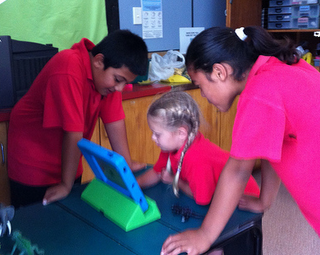 Last year I attended a wonderful PD session from Amanda Signal about using Scratch with middle - upper primary. The subsequent fun and learning in my classroom was a total win.
Last year I attended a wonderful PD session from Amanda Signal about using Scratch with middle - upper primary. The subsequent fun and learning in my classroom was a total win.I tried to introduce Scratch in term 1 this year to my year 4 students. However, it was bad timing as they were still trying to come to grips with managing all things Google.
Term 4 seemed like the perfect chance to try again! - This time with ScratchJr on iPad and Scratch on Chromebooks.

We have spent the last week learning with Scratch and ScratchJr to share our stories, tell jokes and even just to show off the cool things it can do.
Most notably the students learnt about timing and angles through trial and error as they attempted to make their sprites do the unimagined.
The problem solving and thinking at such a young age just can't be beat.
 Today I was asked to send a handful of kids to share ScratchJr with the year 1s. Karen Belt - their teacher, knew that technically her students were more than ready for it, however, having a more focused approach with Tuakana Teina would mean that both her students and the older ones, would be learning, creating and sharing in one happy moment.
Today I was asked to send a handful of kids to share ScratchJr with the year 1s. Karen Belt - their teacher, knew that technically her students were more than ready for it, however, having a more focused approach with Tuakana Teina would mean that both her students and the older ones, would be learning, creating and sharing in one happy moment.The morning was an utter success. Karen commented that you could hear a pin drop in the classroom as her young ones came to grips with a new tool. My kids all thoroughly enjoyed themselves and thought that perhaps the 5yr olds' animations may rival their own. - They now have some work to do!
 The draw card for the students as they create sprites and backgrounds and experiments with code, is indeed the element of experimentation and creating things never created before. They excitedly discuss new found tricks and techniques with friends and eagerly help one another to complete some fairly sophisticated stories.
The draw card for the students as they create sprites and backgrounds and experiments with code, is indeed the element of experimentation and creating things never created before. They excitedly discuss new found tricks and techniques with friends and eagerly help one another to complete some fairly sophisticated stories. Unfortunately, like many iOS apps, ScratchJr is unable to be shared online. So as much as the students want to post their creations on their blog, without screencasting via a laptop or desktop, it can't be done. However, the handful of year 4s working on Scratch should have some fabulous recreations of Hairy Maclairy and some original stories to share in a short while.
Unfortunately, like many iOS apps, ScratchJr is unable to be shared online. So as much as the students want to post their creations on their blog, without screencasting via a laptop or desktop, it can't be done. However, the handful of year 4s working on Scratch should have some fabulous recreations of Hairy Maclairy and some original stories to share in a short while.













